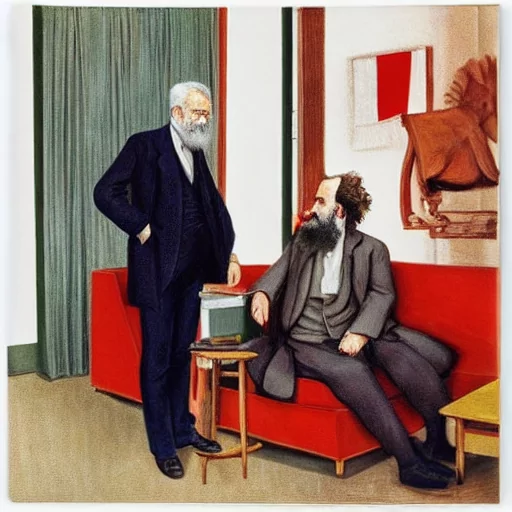
Reclaiming Safety in Uncertain Times: A Deeper Approach to Contemporary Anxiety

On March 1st, 2022, The White House published a memo proclaiming that we are in the midst of a national mental health crisis. It describes President Biden’s plan to address the crisis, including increasing the number of mental health workers, providing mental healthcare to professionals most prone to burnout, and regulating the internet algorithms of youth (The United States Government, 2022). While the memo does not venture to explain the cause of the national crisis, we propose the following: American life is defined by loss, but we are systematically precluded from successfully moving through the process of grieving.
Freud’s “Mourning and Melancholia” is a seminal psychoanalytic essay that explores how individuals cope with loss and grief. Freud distinguishes between normal mourning, which involves a healthy and conscious process of grieving, which has been lost, and pathological melancholia (what we would call depression today), characterized by a deep and prolonged sense of sadness, self-blame, and a distorted self-image. Freud considers grieving to include the loss of people, and essential parts of our humanity; our values, sense of purpose, and sense of connectedness.
In mourning, the individual gradually detaches from the lost object and redirects their emotional investment toward new relationships or activities. However, in melancholia, this process becomes more complicated. Freud suggests that the individual internalizes the lost object and turns their grief inward, leading to a persistent and irrational sense of guilt. The individual in a melancholic (depressed) state may also experience a decline in self-esteem and struggle with self-accusations.
As Freud’s Mourning and Melancholia suggest, the capacity to mourn is central to mental health. However, American culture places little value on mourning, in some cases even pathologizing and problematizing this necessary though difficult process. At the same time, Americans have much to mourn. In the language of Marx, this loss is that of our alienation from our essential human nature, particularly a loss of autonomy, a sense of purpose, and an inability to meaningfully connect with our authentic selves and fellow man. Capitalism obstructs any acknowledgment of this existential loss, instead capitalizing on treating its symptoms. Psychotherapy has the potential to become either a tool of the capitalist culture, reinforcing the pathologization of distress related to existential loss, or a tool of liberation, supporting individuals through successful mourning, and subsequent personal and social change.
Freud asserts that although mourning a loss can be profoundly distressing, once completed, it liberates the ego, the part of the mind that helps us navigate our lives, rendering it “free and uninhibited” (Freud, 1914). However, when the loss is unknown or unrecognized, individuals fall into a state of “melancholia,” (or depression in modern language) characterized by a significant decline in self-regard and a substantial impoverishment of the ego (Freud, 1914, p. 246). In the absence of a clear external loss, the individual tends to blame themselves for their suffering. It is advantageous for a capitalist culture to maintain individuals in a state of melancholy rather than allowing them to mourn. Melancholy fosters an inward focus and an ignorance of external systemic forces, thus reinforcing a capitalist culture.
In his depiction of the interplay of capitalism and psychology, social theorist and psychoanalyst Joel Kovel emphasizes the active role that the American mental healthcare system plays in reinforcing the capitalist state. He argues that late-stage capitalism, in particular, further distances us from our humanity as consumerism, technology, and attempts to control subjectivity increasingly dominate the culture (Kovel, 1980). Kovel suggests that the mental healthcare system has essentially become an extension of the capitalist system by integrating itself with the medical institution (Kovel, 1980). He states, “As is typically the case in our history, a manifestly benevolent and reformist tendency is seized upon for the rationalization – and hence advancement – of capitalist relations (Kovel, 1980, p. 79).” With the advancement of the capitalist system, psychotherapy, the practice that should possess the greatest capacity to identify existential loss, process traumatic grief, and facilitate the development of the capacity to mourn, has instead been co-opted by the very source of our suffering. Consequently, the mental health crisis persists due to the “medicalization” of psychotherapy, with a shift towards managing only the symptoms of unprocessed grief through behavioral control and medication, rather than uncovering and exploring the root causes of suffering.
While psychotherapists today may feel constrained by the system they exist in, there are ways that they can work effectively within it. At Bay Psychology Group, we understand that we are working within a capitalist context. We strive to make therapy more accessible to working people and students by taking insurance. Additionally, therapists at Bay Psychology Group do not see patients on a time-limited basis allowing for a depth of understanding about the patient’s individual and social context and its relationship to their symptoms. We make certain that we hold this context in mind as we consider complex questions concerning pathology and diagnosis.
In “The Dual Potential of Brief Psychotherapy,” critical social theorist and psychiatrist Terry Kupers introduces the idea that the transformative potential of therapy has led to its stringent control by the state. Kupers raises the question of whether personal emancipation from neurotic constrictions (a term encompassing anxiety, depression, OCD, and other common pathologies) fosters social liberation and vice versa (Kupers, 1986, p. 1). We argue that given psychotherapy’s proven effectiveness in expanding one’s capacity to mourn, provided we consciously recognize our alienation from ourselves and the resulting existential loss, there exists substantial liberatory potential. In brief therapy, specifically, the potential for increased accessibility, especially for those most oppressed by the capitalist state, implies the potential for widespread liberation through therapeutically supported progress through mourning towards freedom. The danger, as previously mentioned, is that this very potential has and will continue to prompt capitalism to safeguard itself at all costs by controlling liberatory mechanisms like brief therapy. Consequently, we can anticipate psychotherapy being systematically sanitized under the guise of becoming more “evidence-based” and “results-focused.” It will likely remain mandatory for an individual to receive a diagnosis to access therapy, regardless of how external the causes of their suffering may be.
At Bay Psychology Group our therapists strive to help our patients see themselves not as sick, but as struggling to exist within a system that may prop itself up with their very struggle. We join our patients not to pathologize their suffering, but help them to harness it as a means of moving from existential loss to a form of liberation. We take seriously our potential as liberatory forces in the lives of our patients and reckon with the ways we may have internalized and promulgated a capitalist culture, which may harm them.
Want to work with us? Have Questions? Reach out to us!